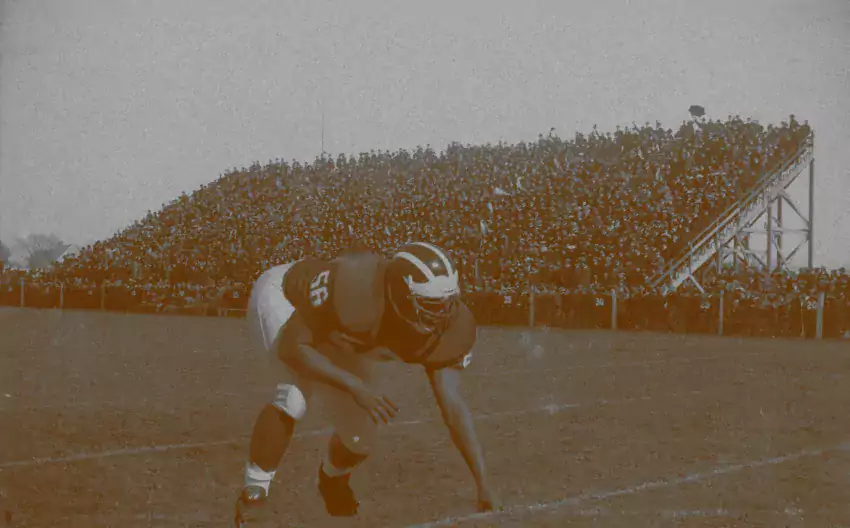
The Teams Tourney: 1998 vs 1902

What is this? A tournament of great Michigan teams past as some gimmick to write about Old Blue over the offseason. I write up a fictitious game between two historical Michigan teams, then eulogize the loser. See the play-in round for further explanation.
Since Tom Brady’s career is now just adding some fourth quarter padding to his lead on Montana, I figured we should go back to the beginning of it. It also gives me an opportunity at the start of this series to decide what I’m going to do when a team from the Stone Age faces one from modern times who just thinks it's from the Stone Age. In truth I think it would be a slaughter, like varsity versus the club team. For the sake of keeping things interesting I’m going to set some ground rules:
- To deal with changing rules, the 1st half is played under the lower seed year's rules, and the 2nd half under the higher seed's rules.
- Old time teams will be treated like they're on a sliding scale of modern subdivisions, so for example the 1901 team will be treated as if it just romped through Division III. In general, pre-1880s=Club, pre-1916=D3, pre-War=D2, pre-1980=FCS, and late 20th century=mid-majors. This is probably inaccurate, but I don't want to punish old teams too much for existing before the University of Michigan invents time travel.
- Injured/suspended players can participate equivalent to the % of the season they played, for example the 1998 team gets Marcus Ray for about a quarter.
- I can cheat for narrative purposes
Here's the bracket, which was made by a phantom NCAA committee we can all agree doesn't know anything about these teams (because I haven't written about them yet):
---------------------------
Round of 64: 1902 (7-seed) vs 1998 (10-seed)
Willie Heston outpaces 1998 safety DeWayne Patmon, because unfair characterizations of DeWayne Patmon's speed are pretty much all anyone remembers about DeWayne Patmon
Both of these teams had to follow national championship seasons, and combined most of those loaded rosters with unprecedentedly good recruiting classes. The 1902s had a much tougher act to follow, as their immediate predecessor (Yost’s first) outscored opponents 555-0. They also returned more, including Willie Heston, one of the best backs in the game’s history. Understandably, the 1998s would feel confident about beating 34 doughty white guys.
At first glance it didn't look very competitive. The 1998s had five offensive linemen over 300 pounds, including sophomores Jeff Backus and Steve Hutchinson, while the 1902s were proud of the fact that their average weight was just 180. Hayden Epstein booted the opening kickoff through the uprights, and a gaping Yost had to be informed that under 1998 rules no points were awarded for that.
The 1998 team built up a solid-enough-looking 9-0 lead in the first half, keyed by two 3rd and long conversions by Tom Brady to Markus Knight and Tai Streets. But the 1902s had the C-Will/A-Train running game scouted well, as the small but fearless Yostmen frustrated 1998 Michigan’s blockers with a seven-man front and diving into gaps. Carr extended the frustration to the fans by refusing to throw the ball despite having Tom friggin’ Brady against eleven dudes who’d literally never seen a forward pass.
The 1998s also kept having to start deep in their own zone. The 1902s managed to pin their afterbears back with a pair of gorgeous 60-yard punts by Everett Sweeney. They also were able to churn out a few first downs each drive, with Jim Herrman's '98 defense persistently confounded by Yost's no-huddle, high-tempo offense. The hurry-up forced Carr to burn all his timeouts early, and that contributed to his decision to run then take a knee when the '98s got the ball back on their 30 with over a minute remaining.
“They’re completely immune to deception,” said Lloyd Carr as his team went into the locker room for halftime. “Even our go-to screen pass wasn’t working.”
“That’s because I invented it,” quipped Yost.
[After the JUMP: The second half under 1902 rules, and one of these teams is eulogized]
---------------------------
With the forward pass turned off, Carr inserted athletic freshman quarterback Drew Henson. Brady came back for the patented Transcontinental play, but the Yostmen were all over it, forcing a three-and-out on the opening drive. Yost then furiously argued that the 1998s shouldn’t be allowed to use multiple platoons. The refs pointed out that there were no rules against it in 1902; an 1897 rule allowed infinite substitution at the discretion of team captains, and once 1998 captain Marcus Ray had been convinced this wasn't a knock on their toughness, the '98 defense was allowed to take the field.
Even with their defensive stars allowed on the field, the 1998s couldn’t deal with their greatest weakness: The Running Quarterback. Whenever they committed WLB Ian Gold to stopping the constant dives by tiny 1902 quarterback Boss Weeks, the ‘98s were getting edged by Willie Heston, who'd missed the first half with an undisclosed injury. Late in the 3rd quarter Heston broke a tackle attempt by 1998 OLB Anthony Jordan, then flat-out burned DeWayne Patmon for a 70-yard score, cutting the lead to 9-6 (touchdowns were worth 5 points, plus an XP try). The 1998 offense did finally figure out how to move the ball without a forward pass by spreading the field and throwing wide receiver screens to David Terrell but couldn't get into the end zone. Field goals were also worth five points, but Jay Feely missed an attempt from 51 and had a 35-yarder blocked by Heston.
With the 1998s struggling to block efficiently run block without putting their hands out, a pair of efficient, 21-play drives by the well-conditioned 1902s took up most of the 4th quarter. The first was stopped by a vicious Sam Sword hit in the backfield, causing a fumble recovered by Rob Renes. But the second ended with a two-yard walk-in by fullback James Lawrence, who also converted the extra point try to put the 1902s ahead 12-9 with just 1:45 remaining.
You can probably guess what happens next. Who wants to tell Yost?
1998 Michigan wins 14-13 and will play the winner of 1940 vs 1948.
---------------------------
About Team 23 (1902)
The sluggish play by 1902 Minnesota on Thanksgiving sealed Michigan's national championship season and sparked a rumor that the Gophers' drinking water had been poisoned. Apocryphally, the accusation convinced Yost to bring his own (little, brown) jug of water to the return game in 1903. [UM Bentley Library]
One of the greatest teams in college football history was sort of a letdown for following the greatest team in college football history, relative to its competition. The second entry of the "Point-a-Minute" era was responsible for the name, outscoring opponents 644 to 12, with 119 of those points in a shutout of Michigan (State) Agricultural, 23 slapped on Notre Dame, and 86 dealt to Ohio State, three non-conference rivals that Michigan had picked up in its pre-conference days.
With Michigan coming off its victory in the first-ever Rose Bowl, Ferry Field was now packed for every game, and recaps were front-page material in the local papers. Victory was so assured that the Detroit Free Press announced Michigan's 48-6 blowout of Case Western in Week 2 with the headline "MICHIGAN'S GOAL LINE CROSSED."
As you might imagine, Michigan's team was full of stars, but the man that stood out was 5'8"/180 left halfback Willie Heston. Injured during spring workouts (an innovation by Yost the previous year), Heston wasn't really himself until late October, so Yost balanced the attack with a ton of misdirection, giving equal carries to halfback Albert Herrnstein, fullbacks Paul J. Jones and James Lawrence, and quarterback Harrison "Boss" Weeks, who started in 1901 and 1902, calling all of Michigan's plays without a huddle. Opponents needing a breather would take to sitting on Weeks after a play, so Weeks just started calling plays from the bottom of the pile. Weeks graduated and went into coaching, but unfortunately died just a few years later—at just 26 years old—from an unknown fever. He remains one of the obscure of the great quarterbacks to come through Ann Arbor.
The spread between Michigan in 1902 and most programs was vast. Yost and AD Charles Baird raided smaller schools for talent at a time when there wasn't much of it to go around. That 119-0 Michigan Agricultural blowout was on the Wednesday between Saturday tilts with Case and Indiana. Yost didn't even bother to join the team for its 107-0 pasting of Iowa, choosing instead to travel on to Minnesota and scout the Gophers.
Three opponents on the schedule were expected to give the Wolverines any trouble. The first was Wisconsin, which also went undefeated in 1901—UW had canceled a Thanksgiving Game with Michigan to play Chicago, then conspired with Amos Alonzo Stagg to offer a conference championship game on Chicago's turf that Michigan declined in favor of the first Rose Bowl. When the teams finally met on a neutral Chicago field in 1902 the game drew national interest, packing 22,000 spectators into Marshall Field, just one of many times a Michigan team would set a national attendance record. The 6-0 score belies a game that rarely saw Wisconsin come close to Michigan's territory, the Badgers keeping pace thanks only to a spate of red zone turnovers.
Chicago, at near the height of its prowess under the legendarily legalist jerkwad Stagg, was the next big fight, but only insomuch as the Chicago papers were proud afterwards that Stagg's defense held Michigan to just 21 points. The third was Minnesota, at that time the big Thanksgiving game. Michigan scored on its first drive and led 12-0 at halftime, at which point Louis Elbel led the Michigan Marching Band as it played a little song he'd written four years earlier. Minnesota recovered and ran forward a punt for just the second score against Michigan in two years, and knocked out Herrnstein, but Michigan scored twice more to put the game away.
Hilariously, Yale, which tied Army 6-6 to go 11-0-1, claims a shared national championship with Michigan for 1902 because they got one vote in one retroactive poll, and that from a guy who had a history with Yost. Nebraska, which doesn't claim a national championship, has a slightly stronger case, going 9-0 with wins at Colorado and Minnesota. At the time the "Champion of the West" was a real thing, and didn't automatically go to the winner of the Big Nine, but Michigan's 23-6 victory over Minnesota sealed Michigan's selection over the Huskers. Dismayed that their weaker independent schedule was a mark against them, Nebraska applied in the offseason to join the conference, but was denied.
Sweeley, Yost, and Heston in 1939 [UM Bentley Library]
January 21st, 2019 at 4:02 PM ^
I'm all for it (content!), but this is going to make Draftageddon look like a youtube click-a-way ad.
January 21st, 2019 at 4:08 PM ^
So I guess the premise is that the teams aren't evaluated relative to their era, but are actually matched up as if they were on the field in their respective primes?
That's a tough break for some of those great older teams. Those Mad Magician teams wind up getting the short shrift because the sport was so different, especially from a strength & conditioning standpoint.
I guess they'll have to content themselves with winning the Rose Bowl. Oh, and WWII.
January 21st, 2019 at 4:19 PM ^
Makes me wonder how college football would have been changed if Nebraska had been admitted to the Big 10 when they applied in 1903.
January 21st, 2019 at 4:36 PM ^
I bet they would have been granted a place in the Big 10 had they kept the name Nebraska Bugeaters.
January 21st, 2019 at 4:26 PM ^
Willie Heston looks like Rick Moranis
January 21st, 2019 at 4:31 PM ^
They all look sort of like Harry Truman, especially Sweeley.
January 21st, 2019 at 6:15 PM ^
Harry S and FDR
January 21st, 2019 at 10:01 PM ^
Tom friggin’ Brady was just a guy at Michigan.
January 22nd, 2019 at 10:32 AM ^
And half the so called fan base was yelling for Henson to play.
Nothing changes.
January 22nd, 2019 at 12:45 AM ^
Sorry, Seth, not getting this. Modern teams have guys that are 100 lbs average heavier, twice as fast, have weight room and diet coaches.
And they play/practice all year long, it's not a club sport.
Any team from 1997 onward would decimate any Yost team or Bo team.
January 22nd, 2019 at 9:21 AM ^
Did you read the article? I addressed this.
January 22nd, 2019 at 8:04 AM ^
Love the historical aspect of this project. How you determine winners/losers is completely immaterial to me. I will enjoy learning more about UM football history and wondering to myself which team I would select as the winner.
Great stuff! Good luck with the process.
PS The '32 team would kick '97 to the curb.
January 22nd, 2019 at 9:57 AM ^
These articles are so cool! I really appreciate the work that goes into this. Like most Michigan fans I've looked through our scores and records from different eras but all the little anecdotes about the teams that I knew next to nothing about (any team before the mid-90s, really) are really fascinating. Thanks Seth! This is awesome.
January 22nd, 2019 at 10:52 AM ^
"With Michigan coming off its victory in the first-ever Rose Bowl..."
Historical accuracy note: the "Tournament East-West Game" was not called the "Rose Bowl" at the time. I should know, right? The "Bowl" itself was not built until a few decades later.
Other than that, fun piece.
January 22nd, 2019 at 11:05 AM ^
Like to hear the facts of the old M teams, their players coaches and outcomes.
Don't like to hear your fictional outcome of games of teams of different eras.
January 22nd, 2019 at 11:43 AM ^
"Even our go-to screen pass wasn't working"
"and a gaping Yost had to be informed that under 1998 rules no points were awarded for that."
I laughed very hard at both of those. Keep this up!
January 22nd, 2019 at 11:51 AM ^
Consistently amazed at how the dumbest content on here always comes from Seth.
January 22nd, 2019 at 2:51 PM ^
Well, we appreciate you giving him a run for his money.

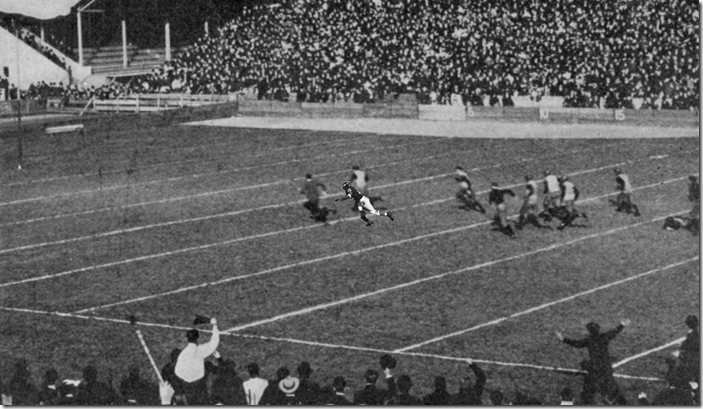
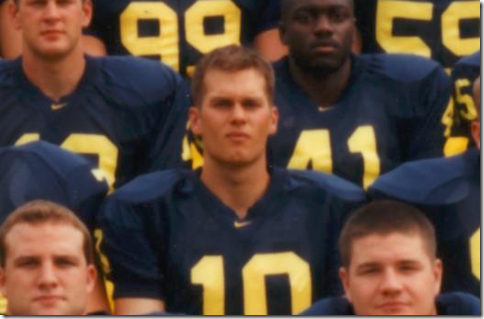
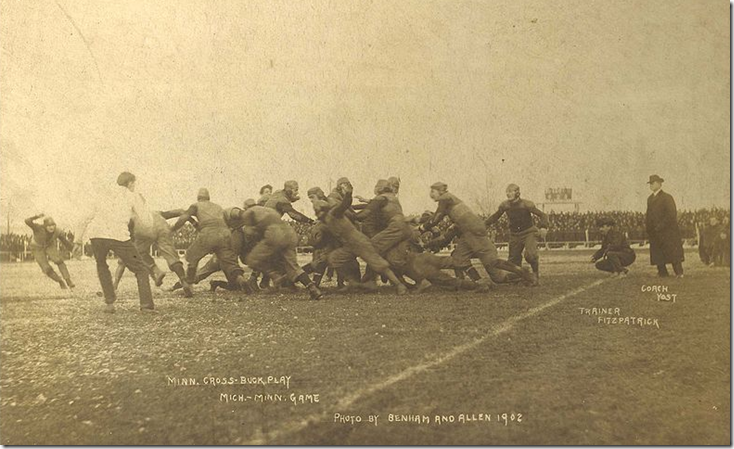
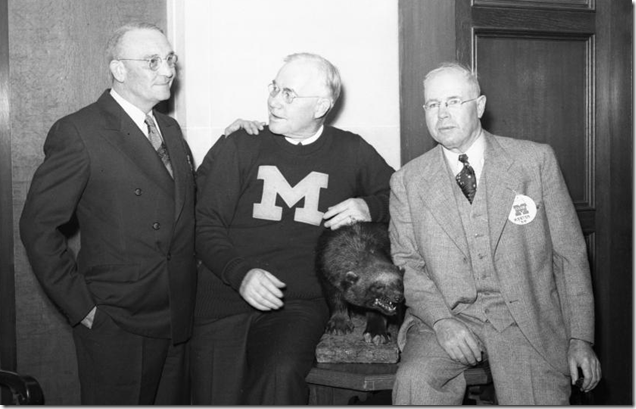
Comments